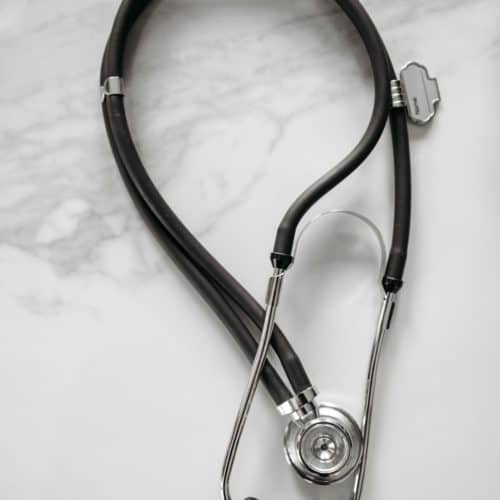
In this article, I will cover general strategies for preparing for medical school interviews. The advice I give comes from my personal experience interviewing for medical schools and also having interviewed prospective students. I also work with students one-on-one as a medical school admissions coach. I will cover the following steps in detail on how to successfully prepare for your medical school interview:
- Practice interview questions
- Know your application in great detail
- Be ready to ask your interviewer questions
- Research the school in advance
- Be confident
- Respond to interview questions succinctly
- Be professional, attentive, and interested
- Follow-up with your interviewer, if allowed
What are medical schools looking for during interviews?
First, we need to understand the objective of the medical school interview. Clearly, the admission committee was impressed enough by your application to send an interview invite. They know that you have the credentials, but now they want to know:
1) If you match up to the person on paper
Sometimes, a candidate can come off very impressive on their application, however, they may fall short in person. You can avoid this pitfall by practicing for your medical school interviews and making sure that how your present yourself in the interview aligns with what is on paper.
2) Your interpersonal skills and sociability
Interpersonal skills and sociability will be gauged during the interview. Can you make people feel comfortable around you? Are you likable and can get along with your future colleagues and clinical teammates? Can you have a conversation with the interviewer?
3) Gauge your actual interest in the school
Interviewees definitely have been flagged for not showing interest in the school during the interview. Please make a genuine effort to show interest and enthusiasm for the program.
In summary, how you present yourself during interviews is critically important. Treat fellow interviewees, interviewers, staff, and everyone else in between with kindness and respect.

Preparing for interview questions
1) Practice, practice, practice
You can access a list of interview questions here. When I practiced, I would write out short and long answers to the most common medical school questions. Then I would practice with someone to get feedback or record myself to pay attention to how my responses came off. If you have a virtual interview, check out this article for specific strategies.
2) Know your application like the back of your hand
Everything that you wrote on your application is fair game during the interview. Even that esoteric research technique that you wish you could forget about from your first research experience. I’ve found that some students make the mistake of preparing for common medical school questions but forget to review their applications. When the interviewer asks questions specific to the student’s application, it catches him or her off guard. When I was interviewing for MD-PhD and MD programs, I made sure to review my application and essays that I submitted the night before the interviews.
3) Prepare questions to ask your interviewer if you are prompted
Often the interviewer will end with “Do you have any questions?” Make sure you have a question ready. Even if you feel like you’ve already ask had all your questions about the school answered by the time of your interview, ask the interviewer what drew them to the institution or what their experience has been in the field.

Things to find out about the school beforehand
1) What is the interview format?
Most medical school interviews will resemble the following: 45- to 60-minute one-on-one interviews, multiple mini-interviews, or group interviews. The interviewer may or may not have read your application beforehand. Read all of the instructions carefully sent by the school.
2) Who is interviewing you?
If you have access to information about who your interview is, I would do a bit of research on them. For example, what is their clinical specialty? What is their research interest, if any? What articles have they published?
3) What is the school’s mission statement?
Hopefully, you read about the school’s mission statement while preparing your secondary application for that particular institution. Make sure to refresh your memory and take a look again at your responses. For example, review available information on the website.

During the interview
a) Be confident
Even if you aren’t feeling confident, fake it until you make it. It doesn’t matter how much you prepared. A lack of confidence can make even the most prepared stumble and leave a less-than-ideal impression. I can empathize with imposter syndrome. Maybe the thought of “maybe they invited me by mistake” or “I don’t belong here” will creep into your mind when you see everyone else. Do whatever you can to create that confidence so you can authentically highlight who you are and reap all of your hard work!
b) Demonstrate that you know medical school entails
Medical school is hard. It’s a long path. Make sure to articulate your experiences to demonstrate that you know what you are getting yourself into.
c) Answer the questions
This may seem like an obvious one but I’ve noticed that when interviewees get nervous, they’ll answer with “Y” when I have about “X.” If I ask about one particular extracurricular activity, a succinct answer will suffice. It’s not a prompt for an autobiography.
d) If you don’t know the answer, don’t make up an answer
It is better to acknowledge that you don’t know the answer than try to make up the wrong one. Trust me on this one.
e) Use what you’ve practiced but don’t come off scripted
Even though you’ve prepared a lot for the interview questions, make sure to come off as natural as possible. The best interviews, in my personal opinion, feel like a naturally flowing conversation.
f) Reaffirm your interest in the school
Succinctly demonstrate that you are well-informed about the school and share your genuine interest in the program.
g) Demonstrate your professionalism
This means dressing appropriately for your interview day (probably will consist of a well-ironed suit or professional attire). Be kind to EVERYONE – interviewer, staff, coordinators, etc.

After the interview
Make sure to follow up with your interviewers (unless you’ve been told beforehand to not contact them) with a thank-you note and reaffirm your interest in the school. I would do this relatively quickly as the admission committee may discuss the interview applicants a day or two later.
Best of luck with your medical school interview!


